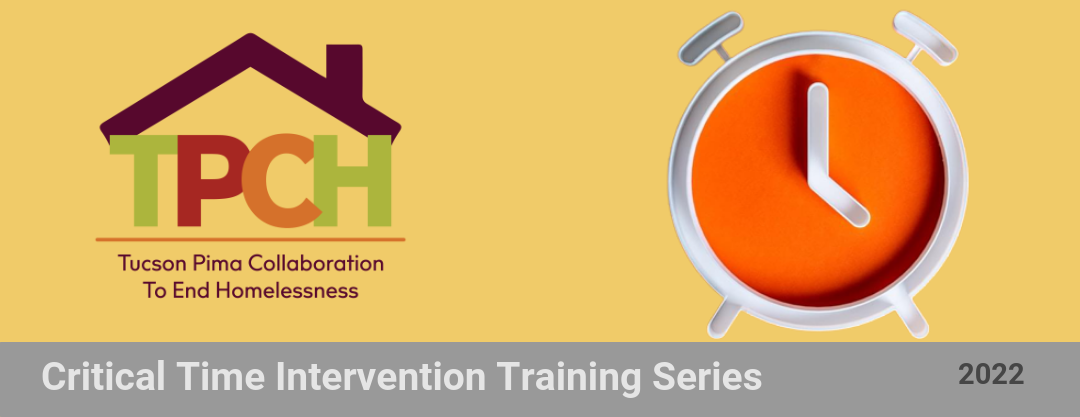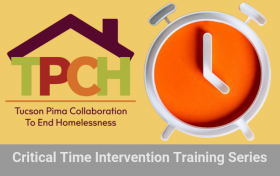 February 18, 2022 Update: This training is at capacity. Registration has been closed and a wait list has formed. If you wish to be placed on the wait list, please email tpch@tucsonaz.gov. Join TPCH for Critical Time Intervention: An Evidence-Based Training Series for Staff Supporting People Experiencing Homelessness: April 6, April 13, and April 20, 2022 TPCH and the City of Tucson Housing and Community Development Department are pleased to offer free Critical Time Intervention training for TPCH member agencies and recipients of City of Tucson grant funds. Training Overview Our three-part Basic CTI training will be held from 9am-12pm on April 6, 13, and 20. All participants who successfully complete the three-part Basic CTI training will receive a certificate of training endorsed by the Center for the Advancement of Critical Time Intervention, Hunter College/Silberman School of Social Work. Within 1-2 months following the Basic CTI series, a fourth session will be held for supervisors and managers who completed the Basic CTI training and would like to learn additional skills for training project staff in CTI practices and managing fidelity to the evidence-based model. We strongly encourage supervisors and managers to attend the series and take advantage of the fourth session in order to meaningfully incorporate CTI into agency programs. Space is limited – the training is limited to 90 attendees. All attendees are asked to attend all 3 sessions. Registration is now closed and the training is at maximum capacity. If cancellations are received, individuals will be added to the training from the wait list in the order of request. Please email tpch@tucsonaz.gov if you would like to be added to the wait list? Can’t Attend or Didn’t Register in Time? Don’t worry – even if you can’t attend the live sessions, the training will be recorded and posted on the TPCH Online Training Center by the end of April. About Critical Time Intervention Critical Time Intervention (CTI) is a time-limited evidence-based practice that mobilizes support for vulnerable individuals during periods of transition. The CTI model facilitates housing stability, community integration, and continuity of care, and has been successful in supporting the return to housing for people with serious mental illness, people experiencing homelessness, veterans, and many other groups. CTI is especially well-suited as a case management model in support of housing problem-solving with individuals and families. Key characteristics of the model include: CTI is time-limited; its explicit aim is to provide intensive, targeted support during a critical period and then withdraw. It is compatible with efforts to intervene with people in crisis, especially during periods of housing instability. CTI is not intended to become a primary source of ongoing support for vulnerable people. CTI workers aim to engage clients, locate effective services and supports in the community, and effectively link them together to promote long-term stability. CTI is highly focused: CTI workers do not try to address all needs that vulnerable individuals and families may have. Rather, CTI focuses only on the key areas that place the client at risk of future housing instability. Meet Our Trainer – Carolyn Hanesworth, LCSW, PhD Dr. Hanesworth is a Critical Time Intervention Trainer, Researcher, and Consultant. In addition to her work with CACTI, Dr. Hanesworth is an Assistant Professor of Social Work at Mercy College in Dobbs Ferry, NY. She has worked as a service provider, leader, and consultant for organizations serving homeless children and families in Texas and New York City for the past 25 years. Recently, she served as the Project Director for the CTI for Rapid Rehousing Pilot Study in Connecticut, where she assisted in adapting and implementing CTI for Rapid Rehousing recipients. |
TPCH & City of Tucson Host Critical Time Intervention Training for Homeless Services (April 6-20, 2022)
